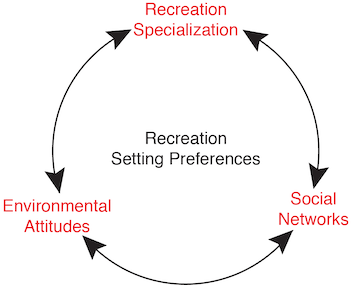Refining the recreation specialization framework to account for social networks and environmental worldviews: Implications for understanding recreation preferences.
Outdoor recreation is a socially significant endeavour that is an intrinsic part of many different aspects of people’s lives. It provides the impetus to interact with natural areas, and forms the basis for impressions of nature. It is critical to understand the attitudes and preferences of the 70% of Canadians who interact with nature to address growing public concerns with, and expectations of, natural resource management and conservation. This research employs a mixed-methods approach to examine people’s interactions with nature to understand the dynamics of their relationships with natural settings:
How does the interplay of outdoor recreation participation, social networks, and environmental worldviews shape recreationists’ preferences for settings and participation outcomes?
Objectives

The goal of this research is to understand the roles of outdoor recreation participation (i.e., recreation specialization), structural location (i.e., social networks), and environmental worldviews in developing preferences for recreation settings, management strategies, and participation outcomes. Four objectives will inform this goal:
- Recreation specialization assumes that people progress along a common trajectory from generalist/novice to specialist/expert. This assumption will be tested across three recreation activities (hunting, birdwatching, and rock climbing).
- Social influences on recreation specialization have been framed in terms of leisure social worlds, which can be diffuse and amorphous. This research extends this framing by examining the social structure of recreationists with different degrees of recreation specialization.
- There is evidence that recreation specialization influences recreation setting preferences. This research extends this line of inquiry to investigate the relative influence of social structure on recreation setting preferences controlling for environmental worldviews.
- Test and refine the assumptions of the recreation specialization framework through an investigation of three distinct recreation activities (hunting, birdwatching, and rock climbing).

